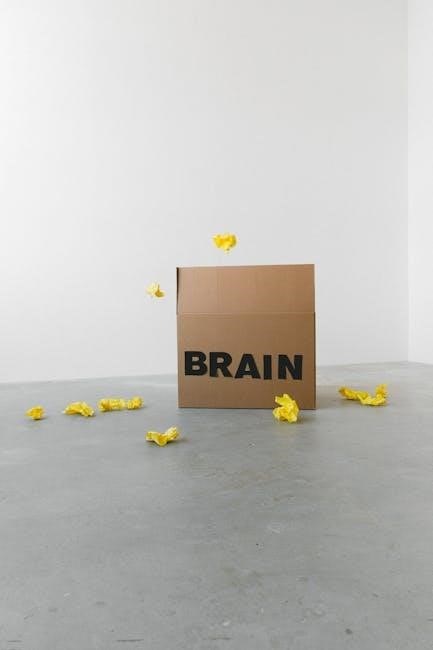The Hudson Abstract Reasoning Test evaluates pattern recognition‚ logical reasoning‚ and abstract thinking skills‚ widely used in employment and academic assessments to measure cognitive abilities․
What is the Hudson Abstract Reasoning Test?
The Hudson Abstract Reasoning Test is a psychometric assessment designed to evaluate non-verbal intelligence‚ focusing on pattern recognition and logical reasoning․ It presents abstract shapes and sequences‚ requiring test-takers to identify underlying principles and apply them to solve problems․ The test is widely used in employment and academic settings to assess cognitive abilities․
With 30 questions to be answered in 15 minutes‚ the test measures conceptual thinking and the ability to analyze abstract information․ It is part of Hudson’s suite of psychometric tools‚ which also includes numerical‚ verbal‚ and personality assessments․ The test is known for its challenging nature‚ emphasizing the ability to think logically and make sound judgments without relying on prior knowledge․
Practice materials‚ such as Hudson Abstract Reasoning Test with answers PDF‚ are highly recommended to familiarize oneself with the question format and improve problem-solving strategies․
Why is it important for assessments?
The Hudson Abstract Reasoning Test is crucial in assessments as it evaluates general intellectual potential‚ focusing on pattern recognition and logical reasoning․ It provides insight into a candidate’s ability to analyze abstract information and make sound judgments‚ free from verbal or numerical biases․ This makes it a fair tool for diverse candidate pools․ Organizations use it to identify individuals with strong problem-solving and conceptual thinking skills‚ essential for complex roles․ By assessing non-verbal intelligence‚ it helps predict job performance and academic success․ Its importance lies in its ability to measure cognitive abilities objectively‚ making it a reliable tool for competitive selection processes․ Practice materials‚ such as Hudson Abstract Reasoning Test with answers PDF‚ are highly recommended for effective preparation․

Structure and Format of the Hudson Abstract Reasoning Test
The test includes 30 questions with a 15-minute time limit‚ focusing on sequences of shapes․ It assesses pattern recognition and logical reasoning skills effectively․
Types of Questions and Patterns
The Hudson Abstract Reasoning Test features various question types‚ including shape sequences‚ pattern completion‚ and logical reasoning exercises․ These questions require identifying underlying rules or principles and applying them to find the correct answer․ Many questions involve sequences of abstract figures where the test-taker must determine the next logical step or identify the missing element․ The patterns often involve geometric shapes‚ colors‚ and spatial arrangements‚ which test the ability to recognize and extrapolate trends․ Some questions may also incorporate more complex logic‚ such as reversible patterns or multiple rule applications‚ challenging the test-taker’s aptitude for abstract thinking and problem-solving․
Time Limits and Question Quantity
The Hudson Abstract Reasoning Test typically consists of 30 questions that must be completed within a strict 15-minute time frame․ This challenging time limit requires test-takers to think quickly and efficiently while maintaining accuracy․ The test is designed to assess not only cognitive abilities but also the ability to perform under pressure․ Each question involves identifying patterns‚ logical relationships‚ or abstract principles‚ and the sheer volume of questions demands strong focus and time management skills․ Practicing under timed conditions is highly recommended to build stamina and improve response speed․ The combination of limited time and complex patterns makes this test a rigorous evaluation of both intellectual and procedural capabilities․

Key Concepts and Skills Assessed
Evaluates pattern recognition‚ logical reasoning‚ and abstract thinking to assess problem-solving abilities and cognitive flexibility in processing non-verbal information and applying principles to new scenarios effectively․
Pattern Recognition and Logical Reasoning
Pattern recognition involves identifying sequences or relationships in abstract shapes or figures‚ often presented in a series․ Logical reasoning requires applying these identified rules to deduce the correct answer․ The Hudson test emphasizes non-verbal intelligence‚ making it accessible to diverse candidates․ Questions may involve completing patterns‚ identifying anomalies‚ or predicting outcomes based on given sequences․ Strong analytical skills are essential to quickly recognize underlying principles․ Practice with similar tests can enhance one’s ability to process information efficiently․ Answer explanations in practice materials highlight common pitfalls and strategies to improve accuracy․ Mastering these skills is crucial for success in the Hudson Abstract Reasoning Test․

Abstract Thinking and Problem-Solving

Abstract thinking requires analyzing complex‚ non-verbal scenarios‚ often involving shape transformations or multi-layered patterns․ This section assesses the ability to conceptualize beyond concrete examples‚ making connections between unrelated concepts․ Problem-solving involves applying these abstract ideas to find innovative solutions․ The Hudson test evaluates how well candidates can think creatively and understand underlying principles․ Practice materials‚ such as those in the Hudson Abstract Reasoning Test with Answers PDF‚ provide insights into common strategies and pitfalls‚ helping candidates refine their skills․ Answer explanations offer a deeper understanding of how to approach ambiguous or multi-step problems․ Mastering abstract thinking is crucial for tackling the test’s more challenging questions effectively․

Preparation Strategies for the Test
Utilize practice tests to familiarize yourself with question formats and time constraints․ Study answer explanations to improve pattern recognition and logical reasoning skills effectively․
Tips for Improving Abstract Reasoning Skills
Regular practice with abstract reasoning questions helps build pattern recognition and logical reasoning abilities․ Start with basic exercises to improve your understanding of shapes‚ sequences‚ and relationships․ Focus on identifying rules governing patterns and applying them consistently․ Break down complex problems into simpler components to enhance problem-solving efficiency․ Learn from answer explanations to refine your approach and avoid common mistakes․ Engage in activities that challenge your mind‚ such as puzzles or logic games‚ to sharpen your cognitive skills․ Dedicate time daily to practice‚ as consistent effort yields significant improvement in abstract reasoning․ Utilize online resources and practice tests to familiarize yourself with the test format and timing․ Analyze your performance to identify areas needing further improvement․ Stay calm and methodical during the test to maximize your score․

Time Management During the Test
Effective time management is crucial for success in the Hudson Abstract Reasoning Test․ With 30 questions to complete in 15 minutes‚ allocate approximately 30 seconds per question․ Start by quickly skimming through the test to gauge the difficulty and plan your approach․ Avoid spending too much time on a single question‚ as it may hinder your ability to complete the test․ Practice under timed conditions to build speed and accuracy․ Focus on solving the easier questions first to secure initial points‚ then return to more challenging ones if time permits․ Staying calm and systematic helps maintain efficiency and reduces the likelihood of errors due to haste․ Proper time allocation ensures you can attempt all questions‚ maximizing your potential score․

Practice Resources and Materials
Free Hudson Abstract Reasoning practice tests with answers are available online․ These include detailed explanations to help improve problem-solving skills and understand exam patterns effectively․

Where to Find Hudson Abstract Reasoning Practice Tests
Hudson Abstract Reasoning practice tests can be found on various online platforms‚ including the official Hudson website and third-party psychometric test providers․ Many websites offer free sample tests with answers and explanations to help candidates prepare․ For example‚ platforms like JobTestPrep provide realistic simulations of the Hudson A-RAT 3R test‚ complete with timed sessions and detailed feedback․ Additionally‚ free resources such as PDF guides and practice question sets are available for download‚ offering a glimpse into the test format and question types․ Utilizing these materials is essential for improving problem-solving skills and understanding the logical reasoning patterns commonly used in the test․ Regular practice with these resources ensures better performance and confidence during the actual assessment․
How to Use Answer Explanations Effectively
Answer explanations are a vital resource for improving performance on the Hudson Abstract Reasoning Test․ After completing practice tests‚ review the explanations thoroughly to understand the reasoning behind correct answers and identify patterns in the questions․ Pay attention to how the underlying rules or principles were applied to arrive at the solutions․ This helps in developing a deeper understanding of the test’s structure and logical reasoning requirements․ Focus on areas where you struggled and analyze common mistakes to avoid them in the future․ Use the insights gained from explanations to refine your problem-solving strategies and improve your ability to recognize abstract patterns․ Regularly applying these lessons will enhance your test-taking skills and boost confidence․
The Hudson Abstract Reasoning Test is a powerful tool for assessing cognitive abilities‚ particularly in pattern recognition and logical reasoning․ By leveraging practice tests and answer explanations‚ candidates can significantly enhance their problem-solving skills and understanding of abstract concepts․ Consistent practice helps identify strengths and weaknesses‚ allowing for targeted improvement․ The test’s focus on non-verbal intelligence makes it a fair and unbiased measure of intellectual potential․ For those preparing‚ utilizing available resources and mastering time management strategies is essential․ With dedication and effective preparation‚ individuals can confidently tackle the Hudson Abstract Reasoning Test and demonstrate their cognitive abilities․ This test not only evaluates skills but also serves as a valuable learning experience for personal and professional growth․
